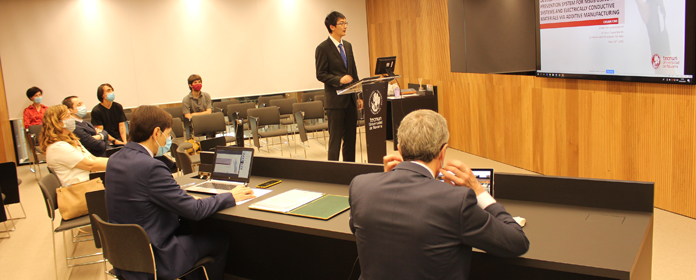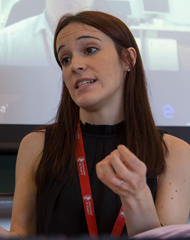Defending the thesis in times of pandemic
40 researchers have read their thesis at the University of Navarra after the confinement, with a new protocol of safety and hygiene measures.

PHOTO: Courtesy

PHOTO: Courtesy
40 thesis have been defended at the University of Navarra after the confinement experienced during the months of March and April due to the covid 19 crisis. After the closure of classrooms and the suspension of academic events, on May 21, Laura Saludas Echarri, from Pamplona, School of Pharmacy and Nutrition, read the first thesis "of the pandemic".
Since then, another 39 researchers, from 13 Schools and 11 countries, have become doctors, thanks to a new protocol established by the academic center, with limited seating capacity and various safety and hygiene measures in the defenses.
The University of Navarra opted for a model blended learning , so that this academic act, one of the most solemn, would maintain part of its essence. Thus, the PhD student or part of the tribunal are present at the classroom; and the rest, connected by video call, from countries such as Colombia, Mexico or Italy. "It is a very relevant event and we wanted its soul to remain at the University, not to be completely online," says Unai Zalba, director executive of the School of doctorate. This has required "a lot of effort" and coordinated work from IT Services and the secretariats of the Schools and schools, he adds.
The 40 doctors of the new "covid era" are in addition to the 92 who defended before confinement, since September. In total, more than 130 new doctors from Spain, Pakistan, Sweden, Italy, USA, Chile, Poland, Uganda, Philippines, Costa Rica, Netherlands, Colombia, Nigeria, Indonesia, Brazil, Peru, Cameroon, Mexico, El Salvador, Ecuador, China, Paraguay or Puerto Rico. All of them will celebrate their investiture next year, together with the promotion of 20/21, since this year's event, which takes place on the first Friday of June, was suspended.
Months of uncertaintyTissue engineering to protect and repair the heart after myocardial infarction was the topic of the first thesis defended at the University after confinement. Laura Saludas presented the work on May 21 while wearing a mask, with three people at the conference room and with part of the court connected online. This graduate of Biochemistry and Master's Degree at research, development and Medicines, who had a scholarship from the association of Friends to make her research, had her defense scheduled for March 31. "As the severity of the pandemic increased, I checked my email every day with the fear of receiving an email from the University stating that the thesis was cancelled. Finally the news came in the form of a call from my director. It was bad news but at the same time expected".
Those months, according to the new doctor, were complicated mainly because of the uncertainty: "At first we thought that the status would not last so long and that after Easter I would be able to defend, but the wait became longer and longer". Finally the day arrived. "We were present my director of thesis , the secretary and me. The rest of the members of the tribunal and my co-director, online. For four years you imagine the moment and I never thought it was going to be like this," he says. Despite the circumstances, everything went well. "It was funny to see us in a classroom of 200 people down to just three people. Itwas a surreal but exciting feelingat the same time," he admits.
The moment that Eugenio Gómez Alatorra, from School in Economics, experienced can also be described as historic. Eugenio starred in the first thesis of the new "covid era" in which the doctor defended his thesis from thousands of kilometers away from the University, connected by video call. In this case from his country, Mexico, where Eugenio works as a professor of Economics in a business school.
"I was finishing the thesis in Mexico and when the pandemic started I didn't know if the defense would be in person, online or postponed. I was planning to ask for a vacation and go to Spain with my family, and just when we were about to buy the tickets, the severity of the pandemic started to be known". Plans changed completely, but Eugenio was able to defend his thesis , on the scheduled date (May 25), from his country. The reading was at 5 a.m., 12 noon Spanish time. "That day, my wife Sandra and I were up very early. I hooked up the computer to the TV so my family could watch it and my father and one of my brothers also joined in. When the court members gave the assessment, my children were already with us," he explains.
Eugenio, whose thesis proposes the use of statistical techniques to measure the impact of an ethics program at business, acknowledges that he would have liked the defense to take place at the University, but it was also an "exciting and very special experience to defend online in the midst of confinement."
"The academic research has transcended boundaries and brought us together."The same opinion, despite the circumstances, is held by Chuan Cao, who read the thesis at Tecnun, the University's School of Engineering. "It was an extraordinary experience to finish my doctorate in such a special period," he stresses. Chuan Cao arrived at Tecnun in 2016 with a scholarship from the Chinese government to develop his doctorate at the area of design Industrial department of Mechanics. Despite the state of alarm, and respecting all security measures, he also managed to defend on the scheduled date, May 29, with part of the court connected on line to classroom of Degrees.
However, in order to arrive on time, many people worked on the preparations. "Everyone's response has been extraordinary. The epidemic status may temporarily separate us from each other, but the academic research has transcended boundaries and united us," concludes the new doctor of engineering.
A future doctor of medicine working on the front line with covidDiego Salas, graduate in Medicine from the Autonomous University of Madrid and a specialist in Medical Oncology, read his thesis , focused on optimizing a subject therapy in patients with ovarian carcinoma, on June 26. Diego is partner at the Clínica Universidad de Navarraat the department de Oncología, and he combined the preparation of the defense with an intense work.
"At the beginning of the confinement we made shifts of attendance face-to-face medical among the members of department to avoid contagion. The work was increased because we needed to cover for other colleagues. So I made time for the thesis mainly on weekends, and several evenings after the end of the work attendance," he explains.
In addition, Diego spent three days working as a volunteer at area Covid, which was set up to attend to the Clinic's staff with suspected infection. "I want to congratulate the team of people who coordinated this area and who trained us to care for these patients, since we were all volunteers and from very different specialties." He also spent an afternoon supporting the emergency team: "I was shocked to attend to people who a few hours before were asymptomatic and in such a short space of time were in a serious or critical condition," he says.
Every year, the University of Navarra welcomes around 1,000 students from doctorate. The thesis are made possible thanks to the contribution of institutions such as the association de Amigos de la Universidad de Navarra, Fundación Bancaria "la Caixa", Fundación Caja Navarra and Banco Santander, as well as alumni.
